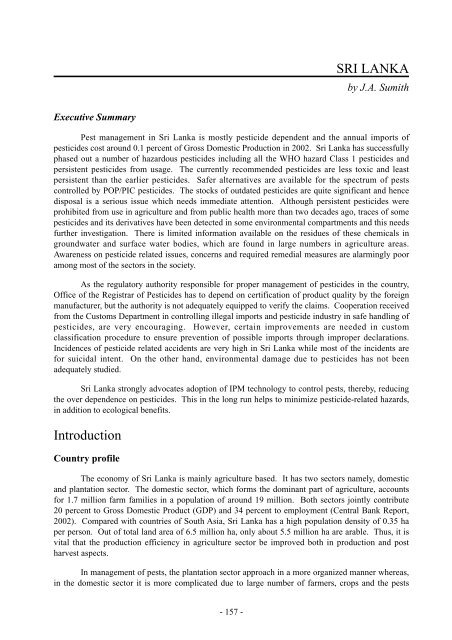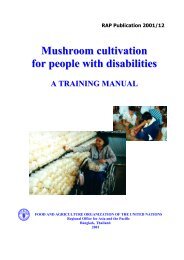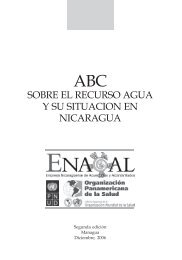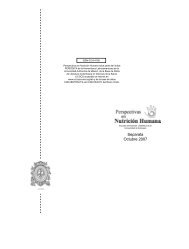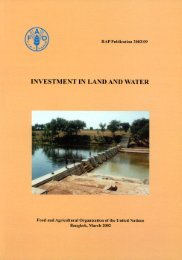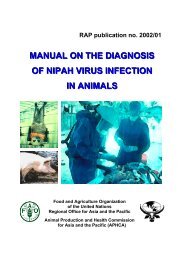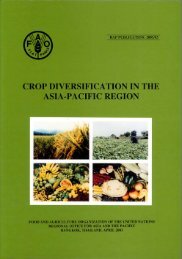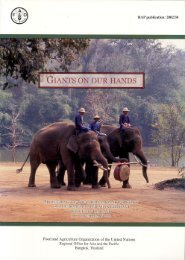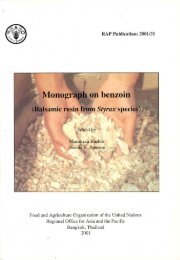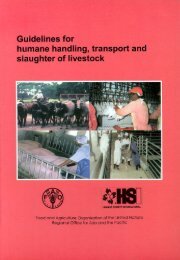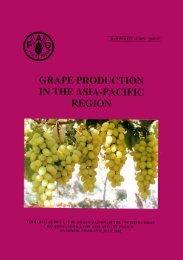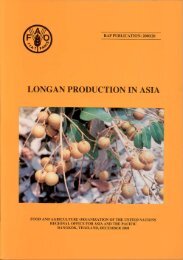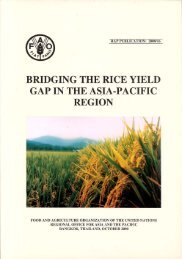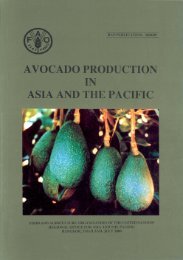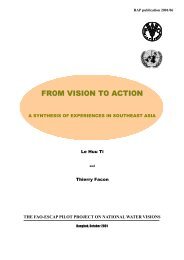Proceedings of the Asia regional workshop on the
Proceedings of the Asia regional workshop on the
Proceedings of the Asia regional workshop on the
You also want an ePaper? Increase the reach of your titles
YUMPU automatically turns print PDFs into web optimized ePapers that Google loves.
Executive Summary<br />
- 157 -<br />
SRI LANKA<br />
by J.A. Sumith<br />
Pest management in Sri Lanka is mostly pesticide dependent and <str<strong>on</strong>g>the</str<strong>on</strong>g> annual imports <str<strong>on</strong>g>of</str<strong>on</strong>g><br />
pesticides cost around 0.1 percent <str<strong>on</strong>g>of</str<strong>on</strong>g> Gross Domestic Producti<strong>on</strong> in 2002. Sri Lanka has successfully<br />
phased out a number <str<strong>on</strong>g>of</str<strong>on</strong>g> hazardous pesticides including all <str<strong>on</strong>g>the</str<strong>on</strong>g> WHO hazard Class 1 pesticides and<br />
persistent pesticides from usage. The currently recommended pesticides are less toxic and least<br />
persistent than <str<strong>on</strong>g>the</str<strong>on</strong>g> earlier pesticides. Safer alternatives are available for <str<strong>on</strong>g>the</str<strong>on</strong>g> spectrum <str<strong>on</strong>g>of</str<strong>on</strong>g> pests<br />
c<strong>on</strong>trolled by POP/PIC pesticides. The stocks <str<strong>on</strong>g>of</str<strong>on</strong>g> outdated pesticides are quite significant and hence<br />
disposal is a serious issue which needs immediate attenti<strong>on</strong>. Although persistent pesticides were<br />
prohibited from use in agriculture and from public health more than two decades ago, traces <str<strong>on</strong>g>of</str<strong>on</strong>g> some<br />
pesticides and its derivatives have been detected in some envir<strong>on</strong>mental compartments and this needs<br />
fur<str<strong>on</strong>g>the</str<strong>on</strong>g>r investigati<strong>on</strong>. There is limited informati<strong>on</strong> available <strong>on</strong> <str<strong>on</strong>g>the</str<strong>on</strong>g> residues <str<strong>on</strong>g>of</str<strong>on</strong>g> <str<strong>on</strong>g>the</str<strong>on</strong>g>se chemicals in<br />
groundwater and surface water bodies, which are found in large numbers in agriculture areas.<br />
Awareness <strong>on</strong> pesticide related issues, c<strong>on</strong>cerns and required remedial measures are alarmingly poor<br />
am<strong>on</strong>g most <str<strong>on</strong>g>of</str<strong>on</strong>g> <str<strong>on</strong>g>the</str<strong>on</strong>g> sectors in <str<strong>on</strong>g>the</str<strong>on</strong>g> society.<br />
As <str<strong>on</strong>g>the</str<strong>on</strong>g> regulatory authority resp<strong>on</strong>sible for proper management <str<strong>on</strong>g>of</str<strong>on</strong>g> pesticides in <str<strong>on</strong>g>the</str<strong>on</strong>g> country,<br />
Office <str<strong>on</strong>g>of</str<strong>on</strong>g> <str<strong>on</strong>g>the</str<strong>on</strong>g> Registrar <str<strong>on</strong>g>of</str<strong>on</strong>g> Pesticides has to depend <strong>on</strong> certificati<strong>on</strong> <str<strong>on</strong>g>of</str<strong>on</strong>g> product quality by <str<strong>on</strong>g>the</str<strong>on</strong>g> foreign<br />
manufacturer, but <str<strong>on</strong>g>the</str<strong>on</strong>g> authority is not adequately equipped to verify <str<strong>on</strong>g>the</str<strong>on</strong>g> claims. Cooperati<strong>on</strong> received<br />
from <str<strong>on</strong>g>the</str<strong>on</strong>g> Customs Department in c<strong>on</strong>trolling illegal imports and pesticide industry in safe handling <str<strong>on</strong>g>of</str<strong>on</strong>g><br />
pesticides, are very encouraging. However, certain improvements are needed in custom<br />
classificati<strong>on</strong> procedure to ensure preventi<strong>on</strong> <str<strong>on</strong>g>of</str<strong>on</strong>g> possible imports through improper declarati<strong>on</strong>s.<br />
Incidences <str<strong>on</strong>g>of</str<strong>on</strong>g> pesticide related accidents are very high in Sri Lanka while most <str<strong>on</strong>g>of</str<strong>on</strong>g> <str<strong>on</strong>g>the</str<strong>on</strong>g> incidents are<br />
for suicidal intent. On <str<strong>on</strong>g>the</str<strong>on</strong>g> o<str<strong>on</strong>g>the</str<strong>on</strong>g>r hand, envir<strong>on</strong>mental damage due to pesticides has not been<br />
adequately studied.<br />
Sri Lanka str<strong>on</strong>gly advocates adopti<strong>on</strong> <str<strong>on</strong>g>of</str<strong>on</strong>g> IPM technology to c<strong>on</strong>trol pests, <str<strong>on</strong>g>the</str<strong>on</strong>g>reby, reducing<br />
<str<strong>on</strong>g>the</str<strong>on</strong>g> over dependence <strong>on</strong> pesticides. This in <str<strong>on</strong>g>the</str<strong>on</strong>g> l<strong>on</strong>g run helps to minimize pesticide-related hazards,<br />
in additi<strong>on</strong> to ecological benefits.<br />
Introducti<strong>on</strong><br />
Country pr<str<strong>on</strong>g>of</str<strong>on</strong>g>ile<br />
The ec<strong>on</strong>omy <str<strong>on</strong>g>of</str<strong>on</strong>g> Sri Lanka is mainly agriculture based. It has two sectors namely, domestic<br />
and plantati<strong>on</strong> sector. The domestic sector, which forms <str<strong>on</strong>g>the</str<strong>on</strong>g> dominant part <str<strong>on</strong>g>of</str<strong>on</strong>g> agriculture, accounts<br />
for 1.7 milli<strong>on</strong> farm families in a populati<strong>on</strong> <str<strong>on</strong>g>of</str<strong>on</strong>g> around 19 milli<strong>on</strong>. Both sectors jointly c<strong>on</strong>tribute<br />
20 percent to Gross Domestic Product (GDP) and 34 percent to employment (Central Bank Report,<br />
2002). Compared with countries <str<strong>on</strong>g>of</str<strong>on</strong>g> South <str<strong>on</strong>g>Asia</str<strong>on</strong>g>, Sri Lanka has a high populati<strong>on</strong> density <str<strong>on</strong>g>of</str<strong>on</strong>g> 0.35 ha<br />
per pers<strong>on</strong>. Out <str<strong>on</strong>g>of</str<strong>on</strong>g> total land area <str<strong>on</strong>g>of</str<strong>on</strong>g> 6.5 milli<strong>on</strong> ha, <strong>on</strong>ly about 5.5 milli<strong>on</strong> ha are arable. Thus, it is<br />
vital that <str<strong>on</strong>g>the</str<strong>on</strong>g> producti<strong>on</strong> efficiency in agriculture sector be improved both in producti<strong>on</strong> and post<br />
harvest aspects.<br />
In management <str<strong>on</strong>g>of</str<strong>on</strong>g> pests, <str<strong>on</strong>g>the</str<strong>on</strong>g> plantati<strong>on</strong> sector approach in a more organized manner whereas,<br />
in <str<strong>on</strong>g>the</str<strong>on</strong>g> domestic sector it is more complicated due to large number <str<strong>on</strong>g>of</str<strong>on</strong>g> farmers, crops and <str<strong>on</strong>g>the</str<strong>on</strong>g> pests


